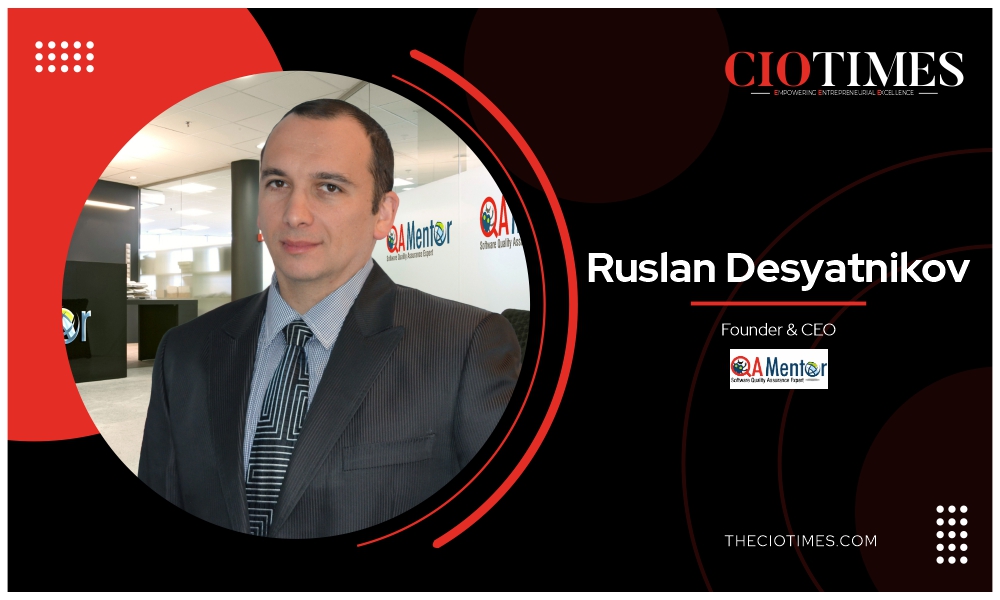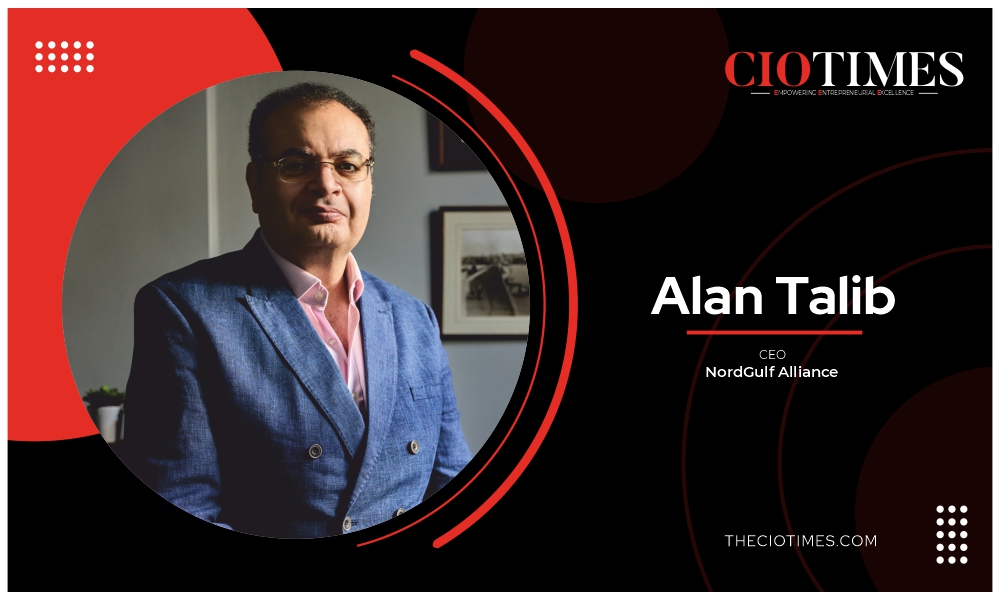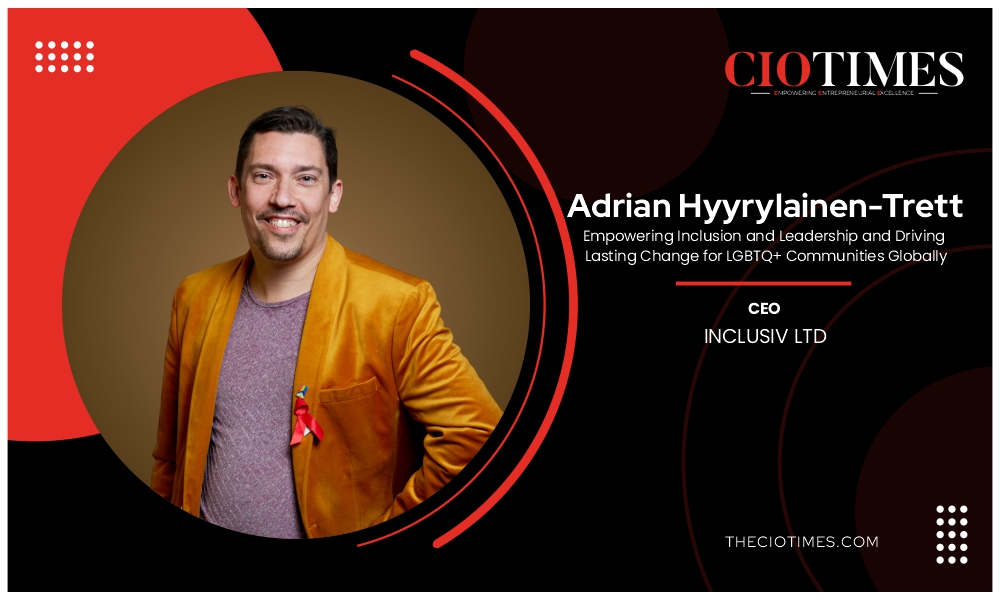Quality analysts have been in demand for as long as anyone can remember. Organizations need to focus on the attributes a product will offer to sustain while competing in the market. For this, setting a quality benchmark is imperative. Experts like Ruslan Desyatnikov, Founder & CEO at QA Mentor, are on a mission to redefine what quality means in a fast-paced digital world. The core principles he developed during his early roles at HSBC and Citi, discipline, precision, and accountability, continue to shape QA Mentor’s methodologies today. In those high-pressure banking environments, quality was never an afterthought; it was a form of risk control and a key business enabler. Every test case carried financial implications, and every missed defect could result in significant losses.
These early lessons became the foundation of QA Mentor’s identity. The firm’s methodologies, particularly HIST (Human Intelligence Software Testing), reflect those same principles, emphasizing measurable value, risk-based prioritization, and human judgment guiding automation. QA Mentor doesn’t simply test functionality; it validates business impact. The mindset Ruslan formed in his banking years remains central to his leadership today, continually linking Quality to Revenue, Risk, and ROI rather than viewing it as a procedural checkbox.
Intelligent Assurance
The philosophy behind HIST, as Ruslan explains, is rooted in a single principle restoring thinking to testing. In an era dominated by automation and speed, the software industry has gradually substituted human reasoning with scripts, templates, and checklists.
He shares, “HIST reverses that shift by re-centering critical thinking, contextual understanding, and investigative depth at the heart of testing.”
Automation remains integral to HIST, but it serves as an enabler rather than a replacement for human insight.
Modern QA faces a constant tug-of-war between velocity and relevance. Teams must release products faster without compromising assurance. HIST resolves this challenge by embedding risk-based prioritization, pattern-driven validation, and adaptive test optimization. The result is accelerated delivery that still ties every test action directly to business value, user experience, and system behavior.
At its foundation, HIST is powered by Investigative Testing, a discipline that elevates QA from mechanical verification to intelligent exploration. It shifts focus from simply confirming whether software works to understanding why and how issues arise, revealing root causes of quality degradation. Testers become quality investigators, combining reasoning, observation, and domain expertise to predict and prevent defects before automation takes over.
Ultimately, HIST transforms QA from a reactive process into a strategic intelligence function, one that quantifies risk, validates business value, and reinforces confidence in every release. By bridging human intuition with machine precision, his HIST approach envisions a future where quality isn’t merely tested in its built in, understood, and intelligently assured.
Leadership Through Quality
Ruslan believes that a truly successful quality leader in today’s digital landscape is not defined by defect counts or automation metrics, but by the ability to connect quality directly to business outcomes. In an era driven by AI, speed, and continuous delivery, true leadership in quality means delivering trust at velocity ensuring every release not only functions seamlessly but also strengthens brand credibility, customer experience, and enterprise resilience.
He asserts, “The best leaders in this space understand that QA is no longer a back-office function.”
It has evolved into a strategic business discipline. The most effective leaders don’t just measure; they interpret metrics in executive language risk mitigation, revenue protection, ROI enhancement, and customer loyalty. They possess fluency in both the technical and financial dimensions of quality.
He views great QA leadership as an exercise in balance: automation blended with human judgment, data interpreted through intuition, and speed anchored by accountability. This philosophy forms the foundation of HIST, where testers act as investigators, strategists, and business partners rather than mere executors.
When founding QA Mentor, his mission was to build an organization where process empowers people, not politics, a space that encourages testers to think critically, innovate freely, and challenge convention. While recognitions such as Testing Leader of the Year are deeply meaningful, he considers the true measure of success to be transformation: when organizations adopt a quality-first mindset, when testers prove that excellence drives profitability, and when quality becomes indistinguishable from business success.
Bridging Quality Gaps
After leading 128 QA Transformation projects across global enterprises, Ruslan identifies the most significant and recurring quality gap as the lack of true ownership of quality and the absence of a formal static testing phase. Many established organizations still treat QA as a post-development checkpoint rather than a strategic safeguard. By overlooking or minimizing static testing activities such as requirement reviews, walkthroughs, and early validations they miss opportunities to prevent nearly 60% of downstream defects caused by unclear or incomplete requirements. Instead, testing is often deferred until late in the lifecycle, when the cost and impact of fixing issues increase exponentially.
This outdated mindset restricts QA to defect detection rather than defect prevention and business assurance. At QA Mentor, he addresses this gap through the HIST framework, embedding static testing discipline, risk-based validation, and measurable value alignment into every phase of development. This approach enables enterprises to evolve from testing for compliance to testing for impact where quality is embraced as a shared responsibility and becomes a fundamental driver of business performance.
Collaborative Intelligence
With HIST, Ruslan emphasizes that the goal is not to replace humans with AI but to make both work smarter together.
He shares, “The key is knowing where human thinking adds value and where AI brings speed and scale.”
Within this framework, testing is viewed through varying levels of cognitive depth. AI handles repetitive and data-intensive tasks such as regression execution, log analysis, anomaly detection, and predictive risk modelling, where machines excel due to their capacity to process vast datasets rapidly and consistently.
However, when context, intuition, and interpretation come into play, humans take the lead. Activities like analyzing ambiguous requirements, validating complex business rules, exploring user experiences, and assessing ethical or usability considerations require human reasoning, something no algorithm can replicate.
To achieve the right balance, HIST employs a Human-AI Collaboration Matrix, ensuring that automation and human insight complement each other seamlessly. Ruslan’s philosophy centers on creating testers who think with machine precision and human empathy. By blending analytical automation with thoughtful human intelligence, teams achieve faster, deeper, and more meaningful testing outcomes without losing the essence of what makes quality assurance truly human.
Strategic Scalability
In the specialized domain of software quality, Ruslan approaches product-market fit not as the pursuit of selling another testing tool but as solving the challenges that executives experience in their balance sheets.
He asserts, “My approach always starts with listening before building.”
It helps him gain insights about where organizations lose money, time, trust, or reputation due to QA functions misaligned with business objectives. Once those pain points are clearly defined, his teams design solutions that translate quality into measurable business outcomes, driving risk reduction, customer retention, and ROI improvement.
When it comes to scaling, Ruslan believes that growth in QA demands intellectual scalability rather than mere operational expansion. At QA Mentor, and now through HIST, he and his team have transformed years of experience into structured, repeatable frameworks maturity models, audit templates, and transformation playbooks. This enables consistency and measurable success whether serving startups or Fortune 500 enterprises, all built on the same proven DNA refined across 128 transformation projects.
For him, the true key to sustainable growth lies in credibility and demonstrated value. When clients recognize that effective QA directly safeguards revenue, ensures compliance, and enhances brand reputation, they begin viewing it not as a cost center but as a strategic advantage. It is through this philosophy that he has turned a specialized craft into a global, multi-award-winning organization, redefining quality as more than a process it’s a business philosophy.
Purposeful Leadership
Ruslan’s leadership philosophy for managing large, multi-country QA teams centres on alignment through purpose, not process. In his view, true collaboration between globally distributed QA, Development, and Business teams doesn’t emerge from more meetings or rigid procedures, it’s built on a shared understanding of why the work matters. When every function sees itself as part of the same value chain protecting customer trust, enabling business outcomes, and delivering measurable value, geographical and cultural divides begin to dissolve.
Before founding QA Mentor, he made a personal commitment to create a politics-free environment one where merit, collaboration, and transparency take precedence over hierarchy. That commitment became reality.
He shares, “Our teams operate with mutual respect, shared accountability, and a collective sense of ownership.”
Internal competition has been replaced by shared success, fostering trust and accelerating problem-solving across time zones.
At QA Mentor, collaboration is anchored on three pillars: transparency, accountability, and empowerment. Open dashboards and measurable quality outcomes ensure that decisions are driven by data, not opinions. Every team member, whether in New York, India, Nigeria, Romania, or Ukraine has equal visibility into progress, priorities, and impact.
Through the HIST framework, he reinforces a “one team, one mission” mindset. HIST promotes cross-functional collaboration where testers think like analysts, developers act as problem solvers, and business stakeholders view QA as a strategic partner. By removing politics and building trust through clarity and shared purpose, he enables innovation to flourish, empowering teams to bring forward their best thinking, regardless of title, geography, or seniority.
Influence Through Insight
As a recognized thought leader contributing to Forbes and CIOReview, Ruslan views thought leadership as an essential part of QA Mentor’s DNA. For him, this commitment is not about visibility or personal branding but about accountability and responsibility. Influencing the direction of an industry publicly demands constant curiosity, challenging assumptions, questioning trends, and presenting frameworks that deliver measurable results. It keeps him intellectually sharp, transparent, and fully aligned with the evolving dynamics of quality and technology.
This dedication to thought leadership deeply informs QA Mentor’s strategic direction. Rather than following industry trends, he and his team strive to define them. Many of QA Mentor’s groundbreaking innovations, such as HIST and its metrics-driven transformation models, originated from insights explored through his articles, webinars, and public discussions. These platforms serve as real-world incubators where new ideas are tested and refined before being scaled globally across client ecosystems.
Thought leadership also enhances QA Mentor’s engagement with the broader QA and technology community. It creates a platform for collaboration with leading executives, innovators, and practitioners, enabling the firm to anticipate emerging needs before they become mainstream. This continuous dialogue fuels innovation and strengthens QA Mentor’s role as a global authority in quality engineering.
Ultimately, Ruslan’s contributions through writing, speaking, and mentorship reinforce QA Mentor’s mission to demonstrate that quality is not a cost but a strategic investment and profit amplifier. This philosophy continues to guide the company’s evolution from reactive QA practices to intelligent, value-driven quality engineering that empowers sustainable business success.
Quality Meets Compliance
Ruslan’s leadership experience at HSBC and Citi profoundly shaped his understanding of quality within high-stakes regulatory environments. In the financial sector, he learned that quality is far more than a technical checkpoint; it is a compliance safeguard and a critical risk control mechanism. A single defect, he observed, can extend its impact well beyond a system failure, potentially resulting in regulatory violations, financial penalties, customer disruption, or reputational loss.
The key lesson he carried forward is that QA must operate as a control partner, not merely a support function. Each test case, validation, and scenario must directly align with specific regulations, business rules, or audit trails. During his tenure at HSBC and Citi, he and his teams embedded QA into governance and control frameworks, giving testers direct visibility into business risks, compliance obligations, and audit requirements. This approach ensured full traceability from requirement to regulation and emphasized the importance of static testing and early requirement reviews as the first and often strongest defense against ambiguity, misinterpretation, and noncompliance.
These experiences laid the groundwork for the philosophy that defines QA Mentor and the HIST framework. He believes that quality, compliance, and business assurance are inseparable pillars of sustainable success. A mature QA strategy, in his view, goes beyond measuring defect counts or coverage; it measures risk mitigation, regulatory readiness, and business confidence.
In financial services and increasingly across all industries, he maintains that true success belongs to organizations that view QA as a strategic control and intelligence layer, one that safeguards not only systems but, most importantly, trust.
Monetizing Quality Intelligence
Ruslan believes the greatest long-term commercial opportunity for established enterprises lies in redefining QA as a strategic profit engine rather than a cost center. Many organizations already have the right foundations, strong infrastructure, vast data pools, and established customer trust, but they often overlook the commercial potential hidden within their quality processes.
When approached strategically, QA and process improvement can evolve into revenue-generating assets. By transforming internal excellence into marketable solutions, companies can create new business lines such as QA-as-a-Service, AI validation frameworks, compliance automation, and data integrity assurance. The same methodologies and governance models built for internal optimization can be packaged into commercial offerings for clients and partners.
Through frameworks like HIST, he and his team have helped enterprises design Quality Intelligence Platforms that monitor risk, reliability, and ROI across systems. These platforms go beyond measurement; they monetize quality by generating insights that enhance customer retention, operational resilience, and strategic decision-making.
He shares, “The future of QA is moving from supporting operations to driving enterprise strategy.”
When organizations recognize that quality intelligence holds the same value as customer data or analytics, they open a new frontier where QA becomes a source of innovation, trust, and sustained revenue.
Intelligent Assurance
Ruslan believes that Generative AI is fundamentally reshaping the software quality landscape, transforming not only what organizations test but how they define correctness itself. Traditional QA once focused on deterministic systems, where identical inputs produced consistent outputs.
He shares, “With AI-driven systems, outputs are probabilistic, adaptive, and influenced by context and data drift.”
This shift requires testers to move beyond binary pass/fail validation and instead assess intent, reasoning, fairness, and explainability.
The biggest AI-driven quality challenge he is helping clients address today centers on ensuring AI reliability, accountability, and trustworthiness. Generative models can produce results that appear sound but may contain logical gaps, factual inaccuracies, or ethical bias risks that multiply when AI is deployed at scale without proper governance. To counter this, his team has introduced testing disciplines such as explainability validation, hallucination detection, adversarial testing, and continuous model revalidation.
Through the HIST framework, he integrates Investigative Testing with AI auditing and governance practices. These testers act as quality investigators, examining not just whether AI systems function correctly, but whether they reason transparently and operate within ethical limits.
For Ruslan, the next evolution of QA lies not in faster automation but in ensuring that AI systems make interpretable, human-aligned decisions. As AI becomes central to business operations, testing must mature into a discipline that certifies not only performance but also trust, transparency, and accountability, the true cornerstones of intelligent quality assurance in the AI era.
Purposeful Curiosity
Ruslan believes that the most important mindset he emphasizes when mentoring the next generation of testers is curiosity guided by purpose. While tools and technologies evolve constantly, the instinct to ask “why” before “how” remains the defining trait of exceptional testers.
He asserts, “True quality professionals don’t just follow scripts or execute cases, they investigate, question, and uncover patterns.”
He also highlights the importance of adaptability, analytical depth, and contextual intelligence. As AI becomes integral to modern systems, testers must learn to interpret model reasoning, challenge data assumptions, and validate outcomes beyond simple functionality. Within his HIST framework, this approach is called Investigative Thinking a mindset that treats systems as evolving ecosystems shaped by data, logic, and user behavior.
Equally vital, he emphasizes a strong sense of ownership and ethical responsibility. Testers today serve as the final guardians of trust ensuring fairness, safety, and integrity across digital systems. The testers who thrive, he notes, will not be defined by their tools but by their ability to ask the right questions, uncover insights, and protect value. By blending human reasoning with technology, they won’t just test software they will uphold the integrity of intelligent systems for the future.
Harmonized Intelligence
Ruslan’s long-term vision for the intersection of Human Intelligence, Artificial Intelligence, and Quality Assurance is a future where both forces operate in seamless harmony, humans bringing judgment, ethics, and empathy, while AI contributes precision, scale, and speed. Together, they form a hybrid intelligence model that redefines how enterprises perceive, measure, and sustain quality.
In his view, QA will evolve beyond being a post-development checkpoint into a predictive intelligence layer embedded throughout the digital ecosystem, continuously interpreting data, monitoring performance, and validating not only functionality but also reasoning, intent, and ethical alignment.
Through his HIST framework, Ruslan envisions testers transforming into quality strategist professionals who train, guide, and audit AI systems rather than simply identifying defects. These experts will serve as custodians of digital trust, ensuring that automated decisions remain transparent, explainable, and ethically sound.
Ultimately, Ruslan’s goal is to achieve trustworthy automation systems capable of justifying their decisions, self-correcting under human oversight, and aligning with both business and societal values. In this new era, Human Intelligence becomes the conscience of AI, while AI amplifies human potential. Together, they will redefine Quality Assurance not just as testing code, but as validating truth, integrity, and purpose across every digital decision an enterprise makes.




